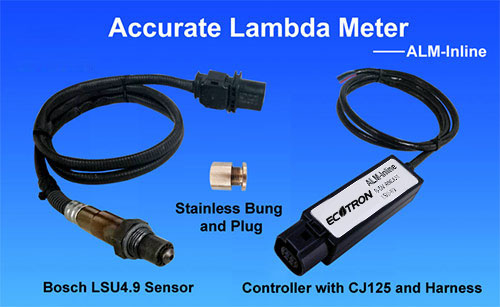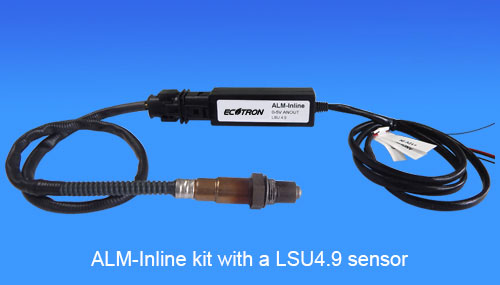ALM-Inline
ALM (Accurate Lambda Meter) is an air-fuel-ratio (AFR) meter which uses the Bosch LSU4.9 or LSU ADV wideband oxygen sensor to accurately measure the AFR or lambda for variant combustion engines, or to simply measure the oxygen concentration of variant exhaust gases.
Click here, if you want to know quickly
“What set ALM apart from other wideband controllers?”
ALM-inline is the smallest version of our ALMs and yet has a rugged enclosure. The enclosure is so small and slim, and it is seamlessly integrated with the cable, that you may not even notice there is a controller. It is part of the cable, and therefore named as “inline”. ALM-inline has the full function of a wideband controller, and the only thing it needs is 12V power supply. Same as our other ALMs, it has a Bosch CJ125 chip built-in. It measures the O2 concentration accurately, and converts it to either lambda, or AFR, as you want. It controls the LSU 4.9 sensor temperature in a close loop mode, accurately at 780 C degrees. ALM-inline can output the lambda, or AFR, or O2% via one of the following options: 0-5V analog voltage, CAN bus, or SCI. You pick one, and one only.
ALM-inline is designed to make the whole wideband control system as a “simple cable”. The user just needs to provide the 12V power and then read the sensor “output”. The whole wideband sensor control is transparent to the user. It simplifies the system and requires the smallest footprint.
Again, all our ALMs have the high accuracy and fast response characteristics, which are the root of our design at the very beginning.
First, ALM uses the advanced LSU4.9 sensor instead of a LSU4.2 which is still used by many other wideband controllers. LSU4.9 is the new generation wideband sensor. It is superior to LSU4.2. (See the appendix: LSU4.2 vs LSU4.9)
Click here to see why LSU 4.9 is superior to 4.2
Recently, we added the LSU ADV as an upgrade to all our ALMs. LSU ADV sensor is even newer than the LSU 4.9. The advantages of LSU ADV can be found here: ALM-LSU ADV
Second, Bosch chip CJ125 is the integrated chip (IC) specifically designed for LSU Sensors. Bosch’s own wideband controller, “LambdaTronic”, uses CJ125 driver chip. In fact, Bosch uses this chip
wherever a LSU sensor is used. The CJ125 and LSU sensor are mated-pair by Bosch. Presumably LSU sensors work the best with CJ125 chips.
Click here for Bosch LT4 wideband controller info
Together, LSU 4.9 and CJ125 make our ALM a more accurate lambda meter in the market.
List of ALM-Inline parts
Small ALM Inline: 3.64″ x 1.18″ x 0.87″
Bosch LSU 4.9 sensor
Stainless plug and bung
ALM-Inline technical specifications
Power supply
Input voltage range DC 12V for the Inline, 12V for the O2 sensor
Input current 60mA typical for the Inline; the heater current directly from 12V supply
Sensors
Standard configuration LSU 4.9 (Support LSUADV;
LSU 4.2 capable but not recommended)
Number of Sensors One
Free air calibration No need
Accuracy
Range of measurement λ = 0.5 ~ ∞
Measurement accuracy ±0.008 @ λ=1.00
±0.01 @ λ=0.80
±0.05 @ λ=1.70
Air/Fuel Ratio Fuel dependent (see lambda range and accuracy)
Range of O2% -21% ~ 21%
Response time
5ms updating rate
0-5v analog output in 5ms updating rate;
Heater
Control Built-in PID control with CJ125
Current Typical 1A;Peak 3.5A
Heater return (H-) Separate wire from Ground
Output
Lambda analog output 0 ~ 5V analog the user can set
Analog accuracy ±0.005V error with a 10-bit DAC chip
Communications
SCI communications(option)
Main-Processor
CPU Freescale MC9S12P128 16-bit micro-processor (Automotive level)
Speed 32MHz
Memory 128k Flash, 6k RAM, 4k Data
Special features
On-Inline-Diagnosis and error report
Self-learning of part-to-part variations, aging effect
Working with different types of fuels (gasoline, diesel, E85, etc)
General
Temperature range -40oC ~ 85oC
Dimensions 3.64″ x 1.18″ x 0.87″
 ALM-Inline manual – v1.1.2
ALM-Inline manual – v1.1.2 
 ALM Serial Communication Protocol – SCI / RS232 / RS485 – v1.6
ALM Serial Communication Protocol – SCI / RS232 / RS485 – v1.6
 ALM Communication Protocol – CAN- v1.9
ALM Communication Protocol – CAN- v1.9 
software
| Characteristics | LSU4.2 | LSU4.9 | Notes |
| lambda range | lambda = 0.65 ~ ∞ | lambda = 0.65 ~ ∞ | |
| Accuracy | only good at lambda = 1 or moderate rich |
accurate at both rich and lean, wider range |
LSU4.2 is only accuracy at lambda ≈1 and moderate rich, between 0.8~1.0 lambda; LSU4.9 has better accuracy in both rich and lean conditions, suitable for gasoline, diesel, CNG, etc. |
| Response time | Slower | Faster | Thinner sensing element of LSU 4.9 makes it more responsive to the AFR change, dynamically more accurate, and easier to light off, less heating power needed. |
| Heating power | 10W | 7.5W | LSU4.2 has the off-centered-heater vs. LSU 4.9 has the centered-heater in the laminate; LSU4.9 has better heating efficiency, less heating power needed. |
| Free air calibrations |
needed | not needed | LSU4.2 is susceptible to reference air contaminations, which is called CSD (characteristic shift down), requires frequent free-air calibrations. LSU4.9 uses reference pump current instead of reference air. No more CSD. No requirement of free-air calibrations |
| Nernst cell resistance vs. temperature |
80~750C | 30~790C | LSU4.9 has higher resolution of internal resistance vs. temperature characteristics, which makes the temperature measurement more accurate, and better heater control, therefore higher accuracy of lambda. |
| Light off time | long | short | LSU4.9 lights off faster. Lambda controls can be active much faster during warm up phase. |
| Reliability | Improved reliability | LSU4.9 is superior to LSU4.2 with regard to the reliability and life. | |
| Check with Bosch | Still selling it | Recommended | Bosch recommends LSU4.9 to all OEMs. Bosch uses LSU4.9 for its own wideband controller. http://www.bosch-motorsport.de/media/catalog_resources/Lambdatronic_LT4_Datasheet_51_en_2785631627pdf.pdf |
Please contact us at info@ecotrons.com for purchase and other inquiries.










